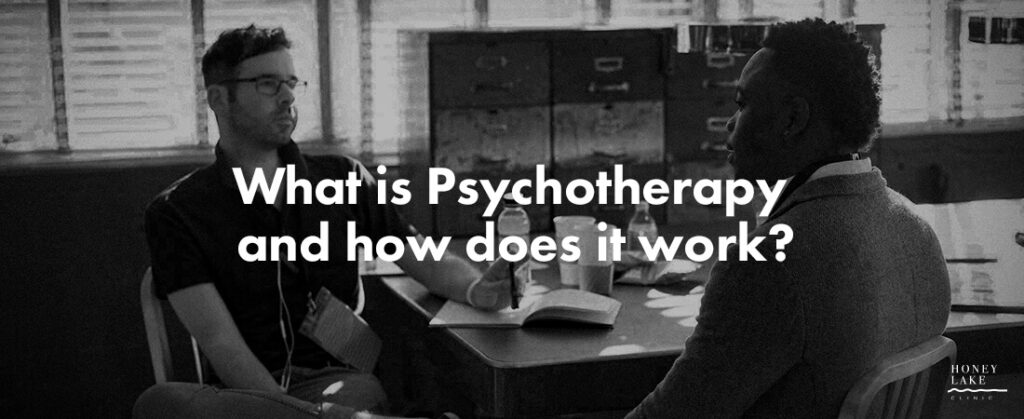What is Psychotherapy and How Does it Work?
Psychotherapy, also known as talk therapy, is a means of treating a variety of mental illnesses and emotional difficulties. Psychotherapy has been effective helping people deal with everything from the difficulties of daily life, the impact of trauma, loss and grief, to specific mental disorders like depression and anxiety.
There are many different types of psychotherapy and some types may work better with certain problems or issues. Psychotherapy is often used successfully in combination with medication or other forms of therapy.
Psychotherapy and Medication
Psychotherapy is often used in combination with medication to treat mental health concerns. In addressing some circumstances, combining medications and psychotherapy works better than either do alone. Situations where medication can help alleviate symptoms allowing a client to better focus on therapy are one example. Healthy lifestyle improvements, such as good nutrition, regular exercise and adequate sleep, can also be an invaluable part of recovery and overall wellness.
Does Psychotherapy Work?
Research shows that psychotherapy can help people experience relief from symptoms and an overall improvement in their lives when they’ve been dealing with mental or mood disorders and addictions. They’ve cited improvements in their emotions and behavior.
With the use of brain imaging techniques researchers have been able to see chemical changes in the brain after a person has undergone psychotherapy. Numerous studies have identified brain changes in people with mental illness (including depression, panic disorder, PTSD and other conditions) as a result of undergoing psychotherapy.
To get the most out of psychotherapy, clients need to approach the therapy as a collaborative effort, be open and honest with their therapist, and follow your agreed upon plan for treatment. Following through with any assignments between sessions, such as writing in a journal or practicing what you’ve talked about is most important.
Types of Psychotherapy
Psychiatrists, therapists and other mental health professionals use several types of talk therapy. The choice of therapy type depends on a client’s particular needs and circumstances. Therapists may combine elements from different approaches to best meet the needs of the person receiving treatment. A few forms of psychotherapy are more well-known and more often applied than others. They include:
Cognitive behavioral therapy (CBT) –useful in helping people identify and change harmful or ineffective thinking and behavior patterns, replacing them with more accurate thoughts and functional behaviors. It can help a person focus on current problems and how to solve them. It often involves practicing new skills in the real world.
CBT can be helpful in treating a variety of disorders, including depression, anxiety, trauma related disorders, and eating disorders. For example, CBT can help a person with depression recognize and change negative thought patterns or behaviors that are contributing to the depression.
Interpersonal therapy (IPT) is a short-term form of treatment. It helps patients understand underlying interpersonal issues that are troublesome, like unresolved grief, changes in social or work roles, conflicts with significant others, and problems relating to others. It can help people learn healthy ways to express emotions and ways to improve communication and how they relate to others. It is most often used to treat depression.
Dialectical behavior therapy (DBT) is a specific type of CBT that helps regulate emotions. It is often used to treat people with chronic suicidal thoughts and people with borderline personality disorder, eating disorders and PTSD. It teaches new skills to help people take personal responsibility to change unhealthy or disruptive behavior. It involves both individual and group therapy.
Additional therapies are sometimes used in combination with psychotherapy. They may include:
- Animal-assisted therapy –working with dogs, horses or other animals to bring comfort, help with communication and help cope with trauma
- Creative arts therapy –use of art, dance, drama, music and poetry therapies
- Supportive therapies –helpful in guiding and encouraging clients in forming their own resources and coping skills
- Play therapy –to help children identify and talk about their emotions and feelings
This is really only the tip of the iceberg. There are thousands of different psychotherapy techniques, some being minor variations, while others are based on very different psychological concepts, ethics, or techniques. Where do you start? Who can you trust? What kind of treatment is right for you?
At Honey Lake, we’re committed to providing you with compassionate care and the practical equipping necessary to significantly improve the condition which brought you to our program. A faith-informed model, experienced staff, licensed professional caregivers, individualized treatment—all in a beautiful and tranquil 1300-acre lakeside setting—we’re here to help you.



